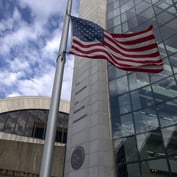The U.S. Securities and Exchange Commission (SEC) has proposed a rule that could affect how insurers use securities-based swaps to manage investment risk.
The SEC has posted a copy of the proposed rule on “Exemptions for Security-based Swaps Issued by Certain Clearing Agencies” today on its website.
The proposed rule could affect the security-based swaps market by making life easier for the clearing agencies that offer or sell swaps to insurers, investment companies, broker-dealers, employee benefit plans, market professionals, and other entities and individuals that are presumed to be “eligible contract participants,” or sophisticated users of security-based swaps.
The proposed rule would eliminate the need for the clearing agencies or equivalent entities to register security-based swaps by exempting the security-based swaps from all provisions of the Securities Act of 1933 other than anti-fraud provisions, the Exchange Act of 1933 registration requirements, and the Trust Indenture Act of 1939, officials say.
If the SEC does not adopt the exemption regulations, “we believe that a registered or exempt clearing agency may not be able to clear security-based swaps in the manner contemplated by the Dodd-Frank [Wall Street Reform and Consumer Protection] Act and our proposed rules implementing its provisions,” officials say.
Dodd-Frank
A swap is an arrangement that two parties use to trade one income stream for another income stream.
Many insurers and other financial services companies use swaps to protect themselves against the risk of changes in interest rates, changes in currency exchange rates, and bond issuer defaults.
In response to concerns about the relationship between the swaps markets and the 2008 credit freeze, drafters of the Dodd-Frank Act included provisions that define a class of “security-based swaps”; give the SEC jurisdiction over security-based swaps and the U.S. Commodity Futures Trading Commission jurisdiction over other swaps; and require many security-based swaps transactions to be cleared through a clearing agency and reported either to the SEC or to a registered security-based swap data repository.
SEC officials refer many times in the proposed rule to “eligible contract participants,” and that term includes insurance companies, officials say in a footnote to the proposed rule.
The Proposed Rule
The SEC wants to create Securities Act Rule 239, which could exempt the sale of security-based swaps that will be issued to eligible contract participants — such as insurers — by, and in a transaction involving, a clearing agency that is registered with the SEC or exempt from SEC registration requirements, officials say.
The offer or sale of a security-based swap would be eligible for that treatment if:
- The security-based swap is or will be issued by a registered clearing agency or a clearing agency exempt from registration requirements.
- The security-based swap must be cleared, or the clearing agency is permitted to clear the security-based swap.
- The security-based swap is sold only to an eligible contract participant in a transaction involving the registered or exempt clearing agency in its function as a central clearing party.
- The clearing agency posts a copy of an agreement on a public website.
The agreement disclosed on the Web must describe the security, loan, index or other instrument underlying the security-based swap; a description of the asset whose value is to be used to determine the amount of the settlement obligation under the security-based swap; and a statement about whether the issuers of the securities or other items underlying the security-based swap are subject to Exchange Act reporting requirements.








 June 09, 2011 at 08:00 PM
June 09, 2011 at 08:00 PM










